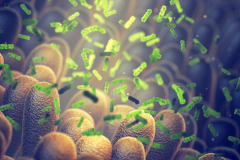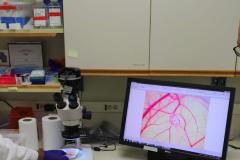- Overview
-
The Immune Response to Lipids
Immune responses are initiated when T cells recognize antigens displayed by antigen presenting cells (APC). Classically, T cell recognition is towards peptide antigens displayed on APC by MHC molecules. More recently, lipid antigens were found to be similarly displayed by the MHC-like molecule, CD1, and recognized by an unconventional class of T cells, including NKT cells. We are interested in exploring the biology of lipid antigen recognition by T cells, and the role this has in a number of human diseases, including autoimmune diseases such as multiple sclerosis, diabetes and lupus, infectious diseases as well as inflammatory diseases such as atherosclerosis.
We have recently discovered a new role for the serum lipoprotein apoE in the immune response to lipid antigens. We will continue to explore the role of apolipoproteins in lipid antigen presentation as this has particular relevance to diseases such as atherosclerosis and autoimmune disease.
A major endeavor will be to identify lipid and glycolipid antigens that are presented by CD1 to T cells in various physiological settings and the role they play in disease. This will involve screening of candidate lipid antigens, as well as discovery approaches to find novel lipid antigens from various biological sources (cells, tissues or blood).
- Publications
-
Characterization of Adaptive-like ¿d T Cells in Ugandan Infants during Primary Cytomegalovirus Infection
Viruses
Jessica Tuengel and Sanya Ranchal and Alexandra Maslova and Gurpreet Aulakh and Maria Papadopoulou and Sibyl Drissler and Bing Cai and Cetare Mohsenzadeh-Green and Hugo Soudeyns and Sara Mostafavi and Peter van den Elzen and David Vermijlen and Laura Cook and Soren Gantt
DOI: 10.3390/v13101987
10/2021Differential depletion of bone marrow resident B-ALL after systemic administration of endosomal TLR agonists
Cancers
Jo, S. and Fotovati, A. and Duque-Afonso, J. and Cleary, M.L. and van den Elzen, P. and Seif, A.E. and Reid, G.S.D.
DOI: 10.3390/cancers12010169
2020Generation of a multi-antigen-directed immune response for durable control of acute lymphoblastic leukemia
Leukemia
Jo, S. and Lee, J.H. and Mattei, J.J. and Barrett, D.M. and Van Den Elzen, P. and Grupp, S.A. and Reid, G.S.D. and Seif, A.E.
DOI: 10.1038/leu.2017.290
2018Autoreactivity to sulfatide by human invariant NKT cells
Journal of Immunology
Stax, A.M. and Tuengel, J. and Girardi, E. and Kitano, N. and Allan, L.L. and Liu, V. and Zheng, D. and Panenka, W.J. and Guillaume, J. and Wong, C.-H. and Van Calenbergh, S. and Zajonc, D.M. and Van Den Elzen, P.
DOI: 10.4049/jimmunol.1601976
2017Activation of invariant natural killer T cells stimulated with microbial a-mannosyl glycolipids
Scientific Reports
Shimamura, M. and Yamamura, M. and Nabeshima, T. and Kitano, N. and Van Den Elzen, P. and Yesilkaya, H. and Andrew, P. and Illarionov, P.
DOI: 10.1038/s41598-017-10309-x
2017Innate immune control of EBV-infected B cells by invariant natural killer T cells
Blood
Chung, B.K. and Tsai, K. and Allan, L.L. and Zheng, D.J. and Nie, J.C. and Biggs, C.M. and Hasan, M.R. and Kozak, F.K. and Van Den Elzen, P. and Priatel, J.J. and Tan, R.
DOI: 10.1182/blood-2013-01-480665
2013Influenza infection in suckling mice expands an NKT cell subset that protects against airway hyperreactivity
Journal of Clinical Investigation
Chang, Y.-J. and Kim, H.Y. and Albacker, L.A. and Lee, H.H. and Baumgarth, N. and Akira, S. and Savage, P.B. and Endo, S. and Yamamura, T. and Maaskant, J. and Kitano, N. and Singh, A. and Bhatt, A. and Besra, G.S. and Van Den Elzen, P. and Appelmelk, B. and Franck, R.W. and Chen, G. and DeKruyff, R.H. and Shimamura, M. and Illarionov, P. and Umetsu, D.T.
DOI: 10.1172/JCI44845
2011CD1d and CD1c expression in human B cells is regulated by activation and retinoic acid receptor signaling
Journal of Immunology
Allan, L.L. and Stax, A.M. and Zheng, D.-J. and Chung, B.K. and Kozak, F.K. and Tan, R. and Van Den Elzen, P.
DOI: 10.4049/jimmunol.1003615
2011NKT cells are required for complete freund's adjuvant-mediated protection from autoimmune diabetes
Journal of Immunology
Lee, I.-F. and Van Den Elzen, P. and Tan, R. and Priatel, J.J.
DOI: 10.4049/jimmunol.1002551
2011Acidification-dependent activation of CD1d-restricted natural killer T cells is intact in cystic fibrosis
Immunology
Rzemieniak, S.E. and Hirschfeld, A.F. and Victor, R.E. and Chilvers, M.A. and Zheng, D. and Van Den Elzen, P. and Turvey, S.E.
DOI: 10.1111/j.1365-2567.2009.03234.x
2010Apolipoprotein-mediated lipid antigen presentation in B cells provides a pathway for innate help by NKT cells
Blood
Allan, L.L. and Hoefl, K. and Zheng, D.-J. and Chung, B.K. and Kozak, F.K. and Tan, R. and Van Den Elzen, P.
DOI: 10.1182/blood-2009-04-211417
2009Administration of PLP
139-151 primes T cells distinct from those spontaneously responsive in vitro to this antigen
Journal of Immunology
Penitente, R. and Nicolò, C. and Van Den Elzen, P. and Di Sante, G. and Agrati, C. and Aloisi, F. and Sercarz, E.E. and Ria, F.
DOI: 10.4049/jimmunol.180.10.6611
2008A public T cell clonotype within a heterogeneous autoreactive repertoire is dominant in driving EAE
Journal of Clinical Investigation
Menezes, J.S. and Van Den Elzen, P. and Thornes, J. and Huffman, D. and Droin, N.M. and Maverakis, E. and Sercarz, E.E.
DOI: 10.1172/JCI28277
2007Conserved and heterogeneous lipid antigen specificities of CD1d-restricted NKT cell receptors
Journal of Immunology
Brigl, M. and Van Den Elzen, P. and Chen, X. and Meyers, J.H. and Wu, D. and Wong, C.-H. and Reddington, F. and Illarianov, P.A. and Besra, G.S. and Brenner, M.B. and Gumperz, J.E.
DOI: 10.4049/jimmunol.176.6.3625
2006CD1 assembly and the formation of CD1–antigen complexes
Current Opinion in Immunology
David L Hava and Manfred Brigl and Peter van den Elzen and Dirk M Zajonc and Ian A Wilson and Michael B Brenner
DOI: 10.1016/j.coi.2004.12.003
02/2005Apolipoprotein-mediated pathways of lipid antigen presentation
Nature
Van Den Elzen, P. and Garg, S. and León, L. and Brigl, M. and Leadbetter, E.A. and Gumperz, J.E. and Dascher, C.C. and Cheng, T.-Y. and Sacks, F.M. and Illarionov, P.A. and Besra, G.S. and Kent, S.C. and Moody, D.B. and Brenner, M.B.
DOI: 10.1038/nature04001
2005Limited clonality in autoimmunity: Drivers and regulators
Autoimmunity Reviews
Van Den Elzen, P. and Menezes, J.S. and Ametani, A. and Maverakis, E. and Madakamutil, L. and Tang, X.-L. and Kumar, V. and Sercarz, E.E.
DOI: 10.1016/j.autrev.2004.07.008
2004Seven surprises in the TCR-centred regulation of immune responsiveness in an autoimmune system
Novartis Foundation Symposium
Sercarz, E. and Maverakis, E. and Van Den Elzen, P. and Madakamutil, L. and Kumar, V. and Powrie and Bach and Miller
2003Autoreactive T cells can be protected from tolerance induction through competition by flanking determinants for access to class II MHC
Proceedings of the National Academy of Sciences of the United States of America
Maverakis, E. and Beech, J. and Stevens, D.B. and Ametani, A. and Brossay, L. and Van den Elzen, P. and Mendoza, R. and Thai, Q. and Macias, L.H. and Ethell, D. and Campagnoni, C.W. and Campagnoni, A.T. and Sette, A. and Sercarz, E.E.
DOI: 10.1073/pnas.0936151100
2003Differential Expression of T-bet, a T-box Transcription Factor Required for Th1 T-Cell Development, in Peripheral T-Cell Lymphomas
American Journal of Clinical Pathology
Dorfman, D.M. and Van Den Elzen, P. and Weng, A.P. and Shahsafaei, A. and Glimcher, L.H.
DOI: 10.1309/J3CTLTTJEVUY4YL0
2003Self-reactive T cells and degeneracy of T cell recognition: Evolving concepts - From sequence homology to shape mimicry and TCR flexibility
Journal of Autoimmunity
Maverakis, E. and Van Den Elzen, P. and Sercarz, E.E.
DOI: 10.1006/jaut.2000.0493
2001Molecular characterization of the T cell repertoire using immunoscope analysis and its possible implementation in clinical practice
Current Molecular Medicine
Ria, F. and Van Den Elzen, P. and Madakamutil, L.T. and Miller, J.E. and Maverakis, E. and Sercarz, E.E.
DOI: 10.2174/1566524013363690
2001Residual public repertoires to self
Journal of Neuroimmunology
Wilson, S.S. and Van Den Elzen, P. and Maverakis, E. and Beech, J.T. and Braciak, T.A. and Kumar, V. and Sercarz, E.E.
DOI: 10.1016/S0165-5728(00)00218-6
2000Inhibition and acceleration of Na+/Ca2+/K+ exchange fluxes by Ag+ in bovine retinal rod outer segments
American Journal of Physiology-Cell Physiology
P. P. Schnetkamp and R. T. Szerencsei and J. E. Tucker and P. Van den Elzen
DOI: 10.1152/ajpcell.1995.269.5.c1147
11/1995 - Research
-
Clinical Interests
Transfusion Medicine
Immune Monitoring
Flow CytometryThe role of NKT cells in the immune response
An important subset of CD1 restricted T cells include “NKT” cells which recognize glycolipids presented by CD1d. NKT cells have been shown to play many diverse roles in immunity from the regulation of autoimmune diseases such as type 1 diabetes to a pro-inflammatory role in diseases such as atherosclerosis. We are studying the mechanisms by which NKT cells exert this control, from their effect on B cells in the production of antibodies, to their effect on classical T cell immunity mediated by CD4+ and CD8+ T cells.Autoimmunity to lipid antigens: The role of CD1-restricted T cells and apolipoproteins
We are exploring whether autoimmunity to self lipids plays a role in the pathophysiology of diseases such as multiple sclerosis, diabetes, lupus and atherosclerosis. This involves characterization of lipid-reactive T cells and anti-lipid antibodies from the peripheral blood or tissues of patients and in animal models of disease.
In multiple sclerosis, the lipid-rich myelin sheath is a target of immune attack, and we are exploring whether this attack is directed at the lipid components of myelin and the role that lipid transport proteins such as apoE have in this recognition.
In type 1 diabetes, autoimmunity is directed against pancreatic beta cells and a regulatory role exists for NKT cells, which recognize glycolipid antigens. We are working to determine the mechanism of this regulation and the role that lipid/glycolipid recognition has in this process.
Lupus is also characterized by autoimmunity to self antigens, and this may include lipid antigens such as phospholipids and blood borne lipids found in lipoproteins.
Atherosclerosis is the underlying cause of the highest number of deaths in the Western World, and the inflammatory process that causes it likely begins early in life, and is particularly a byproduct of diseases such as diabetes, lupus and arthritis. Perturbations in blood lipids are a key feature of atherosclerosis, as is an inflammatory response in the walls of blood vessels. Our work, which defines a pathway by which the immune system directly targets blood lipids, has important implications for the pathogenesis of atherosclerosis. We are exploring whether serum lipids can be targeted in atherosclerosis and associated conditions.
The discovery of lipid antigens that are targeted by the immune system will lead to lipid-based therapies which can alter the immune response.Honours & AwardsMichael Smith Foundation for Health Research 2007, Career Investigator Award 2007-2013
Multiple Sclerosis Society of Canada, Career Development Award 2007-2010

Peter van den Elzen
Peter van den Elzen
Stories See all
Digestive ‘treasure chest’ shows promise for targeted drug treatment in the gut
BCCHR researchers develop new way to match young cancer patients with the right drugs
A pan-Canadian team has developed a new way to quickly find personalized treatments for young cancer patients, by growing their tumours in chicken eggs and analyzing their proteins.
The team, led by researchers from BC Children’s Hospital Research Institute and the University of British Columbia, is the first in Canada to combine these two techniques to identify and test a drug for a young patient's tumour in time for their treatment.
Congratulations CIHR Fall 2024 Project Grant recipients
BCCHR research could help set new international standard for young children receiving bone marrow transplants
New study makes key findings in potential advancement of diabetes cure
Videos
Immunity, When It's Just Right
Donate to Research
We believe there’s nothing we can’t do with your support. It can take years to turn scientific breakthrough into new interventions and treatments. Funding helps speed the pace of change. When given the resources, we can bring transformative therapies – and hope – out of the laboratory and into the clinic to save and improve children’s lives.





